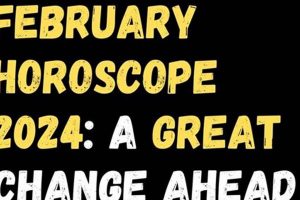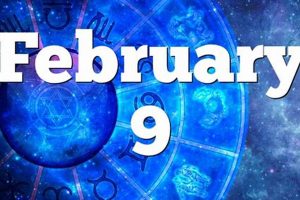The astrological influences present on a specific date, such as the sixteenth of February, derive from the positions of the sun, moon, and planets. These celestial placements are interpreted to understand potential themes and energies that may affect individuals and events. For instance, the sun’s position in a particular zodiac sign shapes the overall astrological backdrop for those born around that time. Additional factors, including the moon’s sign and planetary aspects, add further nuances to the astrological profile of the day.
Understanding the celestial configuration on a given date can offer valuable insights into prevailing cosmic energies. This information can be utilized by astrologers to interpret potential influences on personality traits, relationships, and even broader societal trends. Historically, specific dates have been associated with particular astrological significations, often rooted in cultural and mythological traditions. These associations can provide a richer context for understanding the perceived energies of a given day.
Further exploration of this topic can delve into the specific planetary placements for February 16th of a given year, offering a more detailed analysis. Examination of individual birth charts, considering the interplay between planetary transits and natal positions on this date, can also provide personalized perspectives. Finally, considering the historical context of astrological interpretations for this date can offer a comprehensive understanding of its significance.
Tips for Utilizing Astrological Information for February 16th
Individuals interested in exploring the astrological influences associated with February 16th can benefit from the following suggestions. These tips offer practical ways to understand and apply this information for personal reflection and growth.
Tip 1: Consult an Ephemeris: An ephemeris provides precise planetary positions for specific dates. Referring to an ephemeris for February 16th of the desired year will reveal the exact zodiacal placements of celestial bodies.
Tip 2: Consider the Sun’s Position: The sun’s placement in a zodiac sign provides the foundational astrological energy. Understanding the characteristics of this sign can offer general insights into the day’s themes.
Tip 3: Analyze the Moon’s Influence: The moon’s position shifts frequently and adds emotional nuances to the day’s astrological profile. Noting the moon’s sign and its aspects to other planets offers further insights.
Tip 4: Examine Planetary Aspects: The angles formed between planets, known as aspects, can modify their energies. Understanding these relationships provides a deeper understanding of the day’s complexities.
Tip 5: Research Historical Interpretations: Exploring traditional astrological texts and cultural associations with February 16th can provide a broader context for understanding its astrological significance.
Tip 6: Apply the Information to a Birth Chart: For personalized insights, consider the interplay between the day’s transiting planets and an individual’s natal chart. This can reveal how these energies might uniquely affect individuals born on or around this date.
Tip 7: Reflect on Personal Experiences: Journaling or meditating on personal experiences and observations on February 16th can offer valuable insights into how these astrological influences manifest in one’s life.
By utilizing these tips, one can gain a deeper appreciation for the astrological dynamics at play on February 16th. This information can provide a framework for self-reflection and understanding potential influences on individual experiences and events.
Further exploration might include researching specific astrological events occurring on February 16th of particular years or delving into more advanced astrological techniques to analyze the day’s cosmic energies.
1. Sun's Position
The Sun’s position on February 16th holds significant weight in astrological interpretations. Because the Sun represents core identity and vital energy, its placement in a particular zodiac sign establishes the foundational astrological backdrop for the day. This placement influences the overall themes and energies associated with February 16th in any given year. For example, if the Sun resides in Aquarius on February 16th, the day may carry an emphasis on innovation, independence, and humanitarian concerns. Conversely, a solar placement in Pisces might suggest a focus on empathy, spirituality, and artistic expression. The Sun’s degree within the sign also contributes nuanced details to the interpretation.
Understanding the Sun’s position on February 16th provides a crucial starting point for any astrological analysis. While other celestial bodies, such as the Moon and planets, add further layers of complexity, the Sun’s placement acts as the primary lens through which these other influences are interpreted. This foundational influence extends beyond daily horoscopes; the Sun’s position on someone’s birthday determines their Sun sign, a cornerstone of their natal chart and astrological profile. Therefore, recognizing the Sun’s role in shaping the astrological landscape of February 16th allows for a deeper appreciation of the day’s energetic potential. For instance, if Mercury forms a challenging aspect to the Sun on February 16th, communication might be strained within the Aquarian themes of social connection and progressive thinking.
In summary, the Sun’s position on February 16th anchors the astrological significance of the date. Its zodiacal placement provides the essential context for understanding the interplay of other celestial bodies and their influence on individuals and events. Appreciating the Sun’s role allows for more insightful interpretations of February 16th, offering a valuable framework for navigating the day’s energies. Further analysis may involve examining the Sun’s aspects to other planets, its house placement in a specific chart, and its historical significance within different astrological traditions, further enriching the understanding of this date’s astrological profile.
2. Moon's Influence
The Moon plays a crucial role in astrological interpretations, particularly when considering specific dates like February 16th. Its relatively rapid transit through the zodiac signs imbues each day with a distinct emotional and intuitive flavor. Understanding the Moon’s influence on February 16th of any given year requires examining its sign, house placement, and aspects to other planets. This information adds depth and nuance to the broader astrological landscape established by the Sun’s position.
- Emotional Atmosphere
The Moon governs emotions and instincts. Its placement on February 16th shapes the prevailing emotional atmosphere. A Moon in Cancer might heighten sensitivity and nurturing tendencies, while a Moon in Capricorn could emphasize practicality and emotional restraint. These lunar influences can affect interpersonal dynamics, decision-making processes, and overall mood.
- Intuitive Insights
The Moon connects with intuition and subconscious processes. Its position on February 16th can influence intuitive clarity and access to deeper emotional understanding. For example, a Moon in Scorpio may enhance perceptive abilities, while a Moon in Pisces could heighten sensitivity to subtle energetic shifts. This lunar influence can affect dream recall, creative inspiration, and the ability to connect with one’s inner wisdom.
- Lunar Aspects
The angles formed between the Moon and other planets on February 16th, known as aspects, add further layers of interpretation. A harmonious aspect between the Moon and Venus might foster connection and affection, while a challenging aspect between the Moon and Mars could increase impulsivity and emotional reactivity. Analyzing these lunar aspects provides a nuanced understanding of the day’s emotional dynamics and potential challenges or opportunities.
- Lunar Cycles
The Moon’s phase on February 16th also holds significance. A New Moon can represent new beginnings and opportunities, while a Full Moon might bring heightened emotions and culmination of events. Understanding the lunar cycle within the context of February 16th provides a broader perspective on the energies at play. For example, a Full Moon in Virgo on February 16th could emphasize the need for practical organization and attention to detail within the broader astrological context of the day.
Integrating these facets of lunar influence provides a comprehensive understanding of the Moon’s impact on February 16th. This information complements the Sun’s influence, providing a more complete picture of the astrological energies present. Analyzing these lunar factors alongside other transits and personal birth charts allows for deeper insights into the potential for emotional experiences, intuitive guidance, and interpersonal dynamics on this date. Further exploration could involve studying specific historical events that occurred on February 16th with different lunar placements, potentially revealing correlations between the Moon’s influence and historical trends.
3. Planetary Aspects
Planetary aspects hold a crucial role in understanding the astrological dynamics of any given date, including February 16th. These angular relationships between planets represent specific energetic connections, modifying the expression of each planet involved. Analyzing planetary aspects on February 16th provides valuable insights into the complexities and nuances of the day’s astrological influences. These aspects form the intricate web of relationships that color the overall astrological picture, adding depth and specificity beyond individual planetary placements.
The nature of these aspects, whether harmonious or challenging, significantly impacts their effect. A conjunction, where planets occupy the same degree of the zodiac, intensifies their combined energies. A trine, an angle of 120 degrees, often facilitates smooth flow and cooperation between planetary energies. Conversely, a square, a 90-degree angle, can signify tension and friction, requiring effort and adjustment. An opposition, a 180-degree angle, highlights polarities and the need for balance. For instance, a Venus-Mars conjunction on February 16th could manifest as a surge of passionate energy, while a Mars-Saturn square might present obstacles and frustrations. Consider a hypothetical February 16th where Mercury forms a trine to Jupiter. This alignment could foster optimism, expansive thinking, and fruitful communication. However, if Saturn simultaneously squares Mercury, these communicative benefits might encounter delays or require disciplined focus to overcome limitations. The interplay of these aspects shapes the overall energetic landscape of the day.
Understanding planetary aspects on February 16th offers practical applications for navigating the day’s energies. Recognizing potential challenges allows for proactive strategies. Identifying supportive alignments allows for leveraging opportunities for growth and effective action. Integrating this understanding with other astrological factors, such as the Sun and Moon’s positions, provides a comprehensive framework for interpreting the day’s astrological profile. Analyzing planetary aspects on February 16th offers valuable insights into potential interpersonal dynamics, decision-making processes, and the manifestation of specific events. This deeper understanding enables more informed choices and a greater ability to navigate the day’s astrological currents. Further exploration could involve examining historical events on February 16th and correlating them with prominent planetary aspects, potentially uncovering patterns and insights into how these celestial interactions manifest in concrete situations.
4. Historical Context
Examining the historical context surrounding astrological interpretations for February 16th provides valuable insights into the evolution of astrological thought and cultural associations connected to this date. This exploration illuminates how astrological interpretations have changed over time, influenced by both astronomical observations and evolving cultural beliefs. Understanding this historical context allows for a more nuanced appreciation of contemporary astrological perspectives on February 16th.
- Ancient Astrological Traditions
Ancient cultures, such as the Babylonians and Egyptians, laid the groundwork for many astrological concepts still used today. Exploring their interpretations of planetary positions during the period corresponding to February 16th in the modern calendar can offer insights into the origins of certain astrological associations. For instance, ancient Babylonian texts might reveal how they viewed a particular planetary alignment occurring during this time of year, providing context for contemporary interpretations of similar alignments.
- Medieval and Renaissance Astrology
Medieval and Renaissance astrologers integrated ancient traditions with new astronomical discoveries and philosophical perspectives. Examining texts from these periods can reveal how astrological interpretations of February 16th evolved. For example, the writings of medieval astrologers might reveal how they incorporated specific fixed stars prominent during this time into their interpretations, adding another layer of astrological symbolism.
- Cultural and Symbolic Associations
Throughout history, specific dates have acquired cultural and symbolic meanings that intertwine with astrological interpretations. Exploring historical events, folklore, and religious practices associated with February 16th can enrich the understanding of its astrological significance. For instance, a particular saint’s day falling on February 16th might imbue the date with specific qualities or themes that resonate with astrological interpretations.
- Evolution of Astrological Techniques
Astrological techniques have evolved over time, influenced by new mathematical models, astronomical discoveries, and shifting cultural paradigms. Examining how these developments have affected interpretations of February 16th provides a dynamic perspective on astrological practice. For instance, the development of house systems in Hellenistic astrology likely influenced how astrologers interpreted planetary placements on February 16th, impacting the areas of life emphasized in their analyses.
By exploring these historical facets, one gains a deeper appreciation for the multifaceted nature of astrological interpretations for February 16th. This historical context provides a rich backdrop against which contemporary astrological practices can be understood, highlighting the ongoing evolution of astrological thought and its connection to broader cultural and historical trends. Further investigation might involve comparative analysis of astrological texts across different historical periods, examining how specific astrological events on February 16th were interpreted throughout history, or researching the influence of specific historical figures on astrological interpretations associated with this date.
5. Personal Birth Charts
Personal birth charts, also known as natal charts, provide a personalized astrological blueprint based on the precise date, time, and location of an individual’s birth. Examining a birth chart in relation to the astrological influences present on a specific date, such as February 16th, offers valuable insights into how these transiting energies might interact with an individual’s inherent astrological predispositions. This analysis provides a deeper understanding of the potential impact of February 16th on individuals born on different dates.
- Planetary Transits
Planetary transits refer to the current positions of planets in the sky. On February 16th, specific transits will occur, creating a unique astrological landscape. Comparing these transits to an individual’s birth chart reveals how these energies might affect different areas of their life. For example, a transit of Venus through an individual’s seventh house (relationships) on February 16th could signify a focus on partnerships, while a Mars transit through the tenth house (career) might bring opportunities for professional advancement.
- Natal Chart Aspects
An individual’s birth chart contains inherent planetary aspects, which are angular relationships between planets at the time of birth. Transiting planets on February 16th can form aspects to these natal planets, activating certain themes or creating dynamic tension. A trine from transiting Jupiter to natal Venus on February 16th might bring a sense of optimism and good fortune in relationships, while a square from transiting Saturn to natal Mars might present challenges and require focused effort.
- House Activation
The astrological houses represent different areas of life. Transiting planets on February 16th will occupy specific houses in an individual’s birth chart, highlighting the areas of life most likely to be affected by these energies. A concentration of planets in the fourth house on February 16th might bring focus to family and home matters, while emphasis on the eleventh house could highlight social connections and community involvement.
- Planetary Returns
A planetary return occurs when a transiting planet returns to the exact position it occupied in an individual’s birth chart. A solar return, occurring around an individual’s birthday, represents a new yearly cycle. While a solar return specifically on February 16th would only apply to those born on that date, other planetary returns, such as lunar returns, occur more frequently and can offer insights into shorter-term cycles and themes relevant to February 16th.
By analyzing these facets within the context of February 16th, individuals can gain a personalized understanding of how the day’s astrological influences might manifest in their lives. This integrative approach moves beyond generalized horoscopes, offering a more nuanced and insightful perspective on the potential impact of February 16th. Further exploration might involve comparing the astrological charts of individuals born on February 16th with those born on other dates, examining how different birth charts interact with the same transiting energies, or exploring specific historical events on February 16th in relation to prominent individuals’ birth charts.
6. Current Transits
Current transits form the ever-shifting backdrop against which the astrological significance of a specific date, such as February 16th, unfolds. These transits represent the real-time positions of planets in the sky, creating a dynamic celestial map that interacts with the static placements in a birth chart or the astrological profile of a particular day. Understanding current transits is essential for interpreting the astrological influences active on February 16th of any given year. The positions of planets on this date, relative to their positions at other times, create a unique astrological signature.
The significance of current transits on February 16th lies in their ability to modify and nuance the inherent astrological themes associated with the date. For example, if February 16th typically emphasizes themes of innovation and social connection due to the Sun’s potential placement in Aquarius, current transits can either amplify or mitigate these themes. A transit of Mars through Aquarius on February 16th could intensify the drive for change and independent action, while a Saturn transit through Aquarius might introduce limitations and require a more structured approach to innovation. A hypothetical example could involve a Jupiter-Uranus conjunction in Taurus on February 16th of a particular year. This alignment could bring unexpected financial gains or disruptive breakthroughs, particularly for individuals with significant Taurus placements in their birth charts.
Practical application of this understanding lies in the ability to anticipate potential challenges and opportunities presented by current transits on February 16th. Recognizing the influence of a challenging transit, such as a Mars-Saturn square, allows for proactive strategies to navigate potential conflicts or frustrations. Conversely, awareness of supportive transits, such as a Venus-Jupiter trine, enables individuals to leverage beneficial energies for personal growth, creative expression, or relationship building. Integrating an understanding of current transits with the broader astrological context of February 16th, including the Sun and Moon’s positions and historical interpretations, provides a comprehensive framework for navigating the day’s energies. This synthesis empowers individuals to make more informed decisions and engage with the astrological influences of February 16th with greater awareness.
Frequently Asked Questions about Astrological Influences on February 16th
This section addresses common inquiries regarding the astrological significance of February 16th. The responses aim to provide clear and informative explanations based on astrological principles.
Question 1: Does February 16th hold specific astrological significance across all years?
While the date itself remains constant, the astrological influences on February 16th vary annually due to the changing positions of celestial bodies. Each year presents a unique astrological configuration, requiring specific analysis based on planetary transits.
Question 2: How does one determine the astrological influences for February 16th of a specific year?
Consulting an ephemeris or astrological software for the desired year reveals the precise planetary placements on February 16th. This information forms the basis for astrological interpretations.
Question 3: Do the astrological influences of February 16th affect everyone equally?
While general astrological trends associated with February 16th can be observed, individual experiences are mediated by natal chart placements. Personal birth charts reveal how specific transits on February 16th interact with individual astrological predispositions.
Question 4: Can astrological predictions for February 16th be considered definitive?
Astrology offers insights into potential influences, not deterministic predictions. One’s choices and actions retain free will. Astrological information serves as a tool for self-awareness and informed decision-making.
Question 5: How can one practically apply astrological insights for February 16th?
Understanding the prevailing astrological energies can provide context for navigating potential challenges and opportunities. This awareness can inform decision-making, interpersonal interactions, and personal reflection.
Question 6: What is the relationship between historical astrological interpretations and current understandings of February 16th?
Historical interpretations provide valuable context for understanding the evolution of astrological thought. While contemporary astrology incorporates modern astronomical understanding, historical perspectives offer insights into the symbolic meanings associated with February 16th.
Understanding the nuances of astrological influences on February 16th requires considering the interplay of various factors, including planetary transits, individual birth charts, and historical context. This multifaceted approach provides a more comprehensive and personalized understanding of the potential energies at play.
Further exploration might involve researching specific astrological events on February 16th of particular interest or consulting with a qualified astrologer for personalized guidance.
Astrology February 16
Exploration of astrological influences associated with February 16th necessitates a multi-faceted approach. Planetary positions, including the Sun and Moon’s placements, establish the foundational astrological backdrop. Planetary aspects add layers of complexity, revealing dynamic interactions between celestial bodies. Integrating historical context and considering individual birth charts provides deeper insight into the potential manifestation of these energies. Current transits further refine the interpretation, offering a real-time perspective on the astrological landscape of February 16th.
The astrological significance of February 16th remains an ongoing area of study, inviting further exploration and individualized interpretation. Through continued observation and analysis, the interplay of celestial influences on this date may yield further insights into human experience and the intricate relationship between the cosmos and earthly events. One’s engagement with these astrological influences remains a matter of personal interpretation and application, providing a framework for self-reflection and understanding potential energetic patterns.







